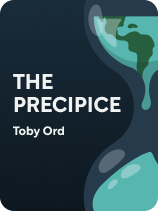

This article is an excerpt from the Shortform book guide to "The Precipice" by Toby Ord. Shortform has the world's best summaries and analyses of books you should be reading.
Like this article? Sign up for a free trial here.
Is the threat of nuclear war still a concern in today’s world? How close have we come to nuclear catastrophe?
The looming specter of nuclear conflict remains a serious global issue. Toby Ord’s analysis in The Precipice highlights the devastating potential of nuclear weapons and our historical mishandling of this technology.
Keep reading to discover the shocking realities of nuclear warfare and its potential impact on human civilization.
Threat of Nuclear War
Ord explains that the threat of nuclear war is serious because nuclear weapons have the power to cause a civilization collapse and we haven’t handled this technology wisely. Ord notes that, even when scientists thought a nuclear bomb could consume all the water from the oceans or ignite the nitrogen in our air and engulf the earth in flames, the US still went ahead with the nuclear attack on Hiroshima during World War II. And, while these effects didn’t occur, the explosion and fallout of the attack killed many tens of thousands. Despite our knowledge of these devastating effects, there have still been three close calls of nuclear attacks since then.
(Shortform note: While Ord primarily discusses the intentional use of nuclear weapons, our inadequate safeguards around nuclear weapons put us at risk of unintentional use as well, arguably increasing the risk. To highlight this, the US and Russia have nuclear-armed missiles on high alert, increasing the risk of accidental launches and mishandling. For example, six live nuclear-armed cruise missiles were mistakenly loaded onto a B-52 bomber in 2007 due to protocol failures and security lapses. Further, personnel may not have sufficient training or follow procedures: In 2003, half of US Air Force units responsible for nuclear weapons failed their safety inspections despite advance notice.)
Ord explains that a nuclear war could lead to civilization collapse and even human extinction due to radioactive fallout—when the bombs go off, fires engulfing entire cities would produce enough smoke to reach the stratosphere where it’s too high to be rained out. It would then block the sunlight, leading to a nuclear winter that would kill crops and lead to starvation for billions. Further, Ord explains that if we increase our nuclear arsenal to 10 times what we currently have, the radioactive fallout of nuclear war could cover the entire earth.
(Shortform note: Like the eruption of a supervolcano, it may be hard to imagine the scale of the damage that a nuclear war would cause. With this in mind, researchers at Princeton University have created a simulation showing the effects of nuclear war between the US and Russia based on real force postures (the overall disposition, strength, and condition of readiness of the US and Russian militaries), targets, and fatality estimates. They estimate that, in the immediate aftermath, over 90 million people would be dead or injured.)
However, Ord suggests that while billions may starve, human extinction is unlikely. In such desperate times, humanity might resort to alternative food production methods like planting cold-tolerant crops or farming algae. Despite this glimmer of hope, he acknowledges many uncertainties surrounding our understanding of a nuclear winter’s impact and calls for further research on this topic.
(Shortform note: Researchers say that despite starvation, a small population of humans would survive to repopulate the Earth and avoid extinction. However, the starvation would be dire—they specify that in a global nuclear war scenario, China’s food calories would decrease by 97.2%, France’s by 97.5%, Russia’s by 99.7%, the UK’s by 99.5%, and the US’s by 98.9%.)

———End of Preview———
Like what you just read? Read the rest of the world's best book summary and analysis of Toby Ord's "The Precipice" at Shortform.
Here's what you'll find in our full The Precipice summary:
- How an apocalypse that ends humanity is possible
- How we can still prevent an existential catastrophe
- The three most likely species-ending events in the future






